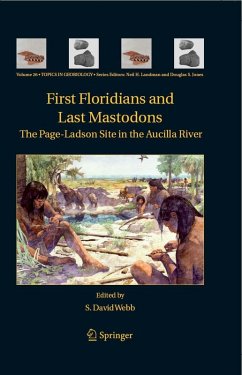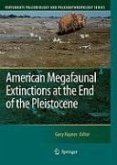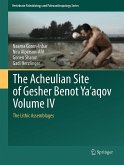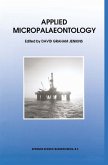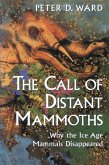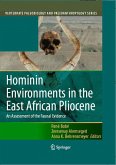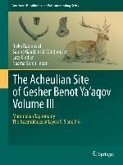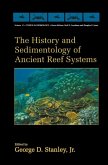This book presents the multidisciplinary results of an extensive underwater excavation in north Florida. This yielded the most complete results of interactions between early Paleoindians and late Pleistocene megafauna, in a rich environmental context in eastern North America. The data provides fundamental insights into "the Peopling of the Americas" and "The Extinction of the Megafauna". An excellent color photo section expresses the uniqueness of this project.
Dieser Download kann aus rechtlichen Gründen nur mit Rechnungsadresse in A, B, BG, CY, CZ, D, DK, EW, E, FIN, F, GR, HR, H, IRL, I, LT, L, LR, M, NL, PL, P, R, S, SLO, SK ausgeliefert werden.
From the reviews:
"A monument of interdisciplinary scientific analysis and reporting, and absolutely essential reading for anyone interested in the early human settlement of the Americas." David G. Anderson, Dept. of Anthropology, The University of Tennessee, Knoxville, TN, USA.
"An excellent array of interdisciplinary studies conducted at an important site offering new and exciting clues on the origins of the First Americans" Dr. Stanford, Dept. of Archeology, Smithsonian Institution, Washington, DC, USA
"This impressive volume represents the culmination of over 20 years of underwater archaeological and paleontological research on one of the most significant Paleoindian sites in the southeastern United States. ... The many important contributions in this volume have made tremendous progress toward that goal. ... I highly recommend First Floridians and Last Mastodons to anyone interested in Paleoindian archaeology, late Pleistocene paleontology, or Quaternary paleoecology and climate change. It is certain to become an important reference work in those fields." (Gary S. Morgan, Journal of Mammalian Evolution, Vol. 15, 2008)
"This collective, edited work represents the culmination of 20 years of research, collection, and management of one of the most productive, underwater paleontological sites in the southeastern US ... . The book is a fine addition to the library for those of us concerned with Pleistocene and Holocene aspects of the fossil record. ... Certainly the book will appeal to academics, scientists and researchers in the fields of geology, paleontology, archaeology, biology, and ecology." (D. M. Jarzen, AASP Newsletter, Vol. 41 (3), 2008)
"A monument of interdisciplinary scientific analysis and reporting, and absolutely essential reading for anyone interested in the early human settlement of the Americas." David G. Anderson, Dept. of Anthropology, The University of Tennessee, Knoxville, TN, USA.
"An excellent array of interdisciplinary studies conducted at an important site offering new and exciting clues on the origins of the First Americans" Dr. Stanford, Dept. of Archeology, Smithsonian Institution, Washington, DC, USA
"This impressive volume represents the culmination of over 20 years of underwater archaeological and paleontological research on one of the most significant Paleoindian sites in the southeastern United States. ... The many important contributions in this volume have made tremendous progress toward that goal. ... I highly recommend First Floridians and Last Mastodons to anyone interested in Paleoindian archaeology, late Pleistocene paleontology, or Quaternary paleoecology and climate change. It is certain to become an important reference work in those fields." (Gary S. Morgan, Journal of Mammalian Evolution, Vol. 15, 2008)
"This collective, edited work represents the culmination of 20 years of research, collection, and management of one of the most productive, underwater paleontological sites in the southeastern US ... . The book is a fine addition to the library for those of us concerned with Pleistocene and Holocene aspects of the fossil record. ... Certainly the book will appeal to academics, scientists and researchers in the fields of geology, paleontology, archaeology, biology, and ecology." (D. M. Jarzen, AASP Newsletter, Vol. 41 (3), 2008)

